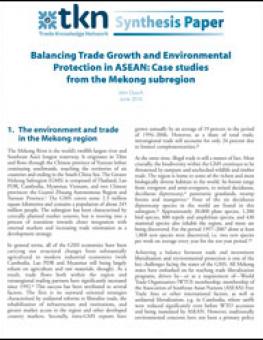
Balancing Trade Growth and Environmental Protection in the ASEAN: Case studies from the Mekong subregion
The Mekong River is the world's twelfth-largest river and Southeast Asia's longest waterway. It originates in Tibet and flows through the Chinese province of Yunnan before continuing southwards, touching the territories of six countries and ending in the South China Sea. The Greater Mekong Subregion (GMS) has been characterized by centrally planned market systems, but is moving into a process of transition towards closer integration with external markets and increasing trade orientation as a development strategy.
Achieving a balance between trade and investment liberalization and environmental protection is one of the key challenges confronting the states of the Mekong. All the Mekong states have embarked on far-reaching trade liberalization programs, driven by—or as a requirement of—World Trade Organization membership, membership in the Association of Southeast Asian Nations (ASEAN) Free Trade Agreement or other international factors.
The expansion of trade and liberalization initiatives further pressurizes the environmental sustainability of this region. Apart from formal trade and investment regimes, illegal trade—particularly of wildlife and timber products—is also undermining the sustainability of the region's environment.
Key findings:
-
An important focus in the GMS has been hydropower and the setting up of regional power grids to support regional power trade.
-
Another focal point is the development of logistic transportation in the region, particularly the introduction of nine GMS economic corridors, which was prioritized as the most important program in the region to facilitate and enhance regional trade and investment.
-
The development of transportation infrastructures has contributed to environmental impacts, including soil erosion, direct impacts on wildlife through increased pressure from illegal trade and overexploitation of forest resources through unsustainable logging.
-
While it is true that the quantity of environmental policies and regulations in the GMS—as almost everywhere in the world—has increased due to the pressure and lobbying of both international and domestic stakeholders, environmental ministries are often ill-equipped either to enforce existing regulations or to design, implement, monitor, inspect and enforce new effective environmental policies.
-
One of the most crucial issues of intraregional cooperation on trade and investment that potentially undermines the environmental sustainability of the region is the absence of any legally binding and enforceable commitment to the environment.
-
While governments in most countries of the GMS have been gradually adopting laws to create a simple and transparent rules-based, market-oriented system, the protection of the environment and the sustainable use of resources regularly take a backseat in the industrialization process that is ongoing in all these countries.
Key recommendations:
On combating the illegal trade in wildlife:
-
GMS countries should negotiate a new protocol to the Cross-Border Transport Agreement recognizing the need to incorporate the control and regulation of wildlife and timber trade into the system.
-
GMS countries should aim to coordinate conservation activities across ecoregions and increase research and capacity building to gather data on the status of particular ecoregions; coordinate subregional enforcement through ASEAN-WEN and ensure close cooperation among customs authorities; create a single database of all laws related to forest and biodiversity conservation, penal laws on illegal trade of wildlife and timber, and descriptions of prohibited species; establish harmonized marking rules and standards for legally traded timber and wildlife; and establish a system whereby customs authorities have immediate access to the records of conservation authorities.
On combating climate change:
-
Existing and proposed trading mechanisms and resulting projects and programs should be subjected to climate risk assessment.
-
A way forward for the ASEAN Secretariat is the mainstreaming of climate change in the ASEAN Institutional Framework for Economic Cooperation. This will require a rethinking of the interface between the Economic and Socio-Cultural Communities' way of working under the Roadmap for an ASEAN Community 2009-2015.
-
Trade driven technologies must ensure that adaptive capacities are enhanced through the process of technology transfer and avoid any tendency to foster dependency.
You might also be interested in
Tree Planting for Climate Resilience in Freetown, Sierra Leone
This assessment presents the economic valuation of tree planting efforts in Freetown, Sierra Leone, including planting costs, added benefits, and avoided costs.
Sustainable Asset Valuation of Sherwan Hill Adventure Park in Abbottabad, Pakistan
This report analyzes the social, economic, and environmental benefits of the Sherwan Hill Adventure Park in Pakistan.
December 2024 | Carbon Minefields Oil and Gas Exploration Monitor
In November 2024, 23 oil and gas exploration licences were awarded across five countries, with Russia granting the licences that account for the largest portion of embodied emissions.
Toward a Coherent, Transformative Approach to Financing Sustainable Development, Climate, and Nature
Four key proposals for the Fourth Financing for Development Conference (FfD4) to create an integrated, equitable approach to financing climate, nature, and development goals.